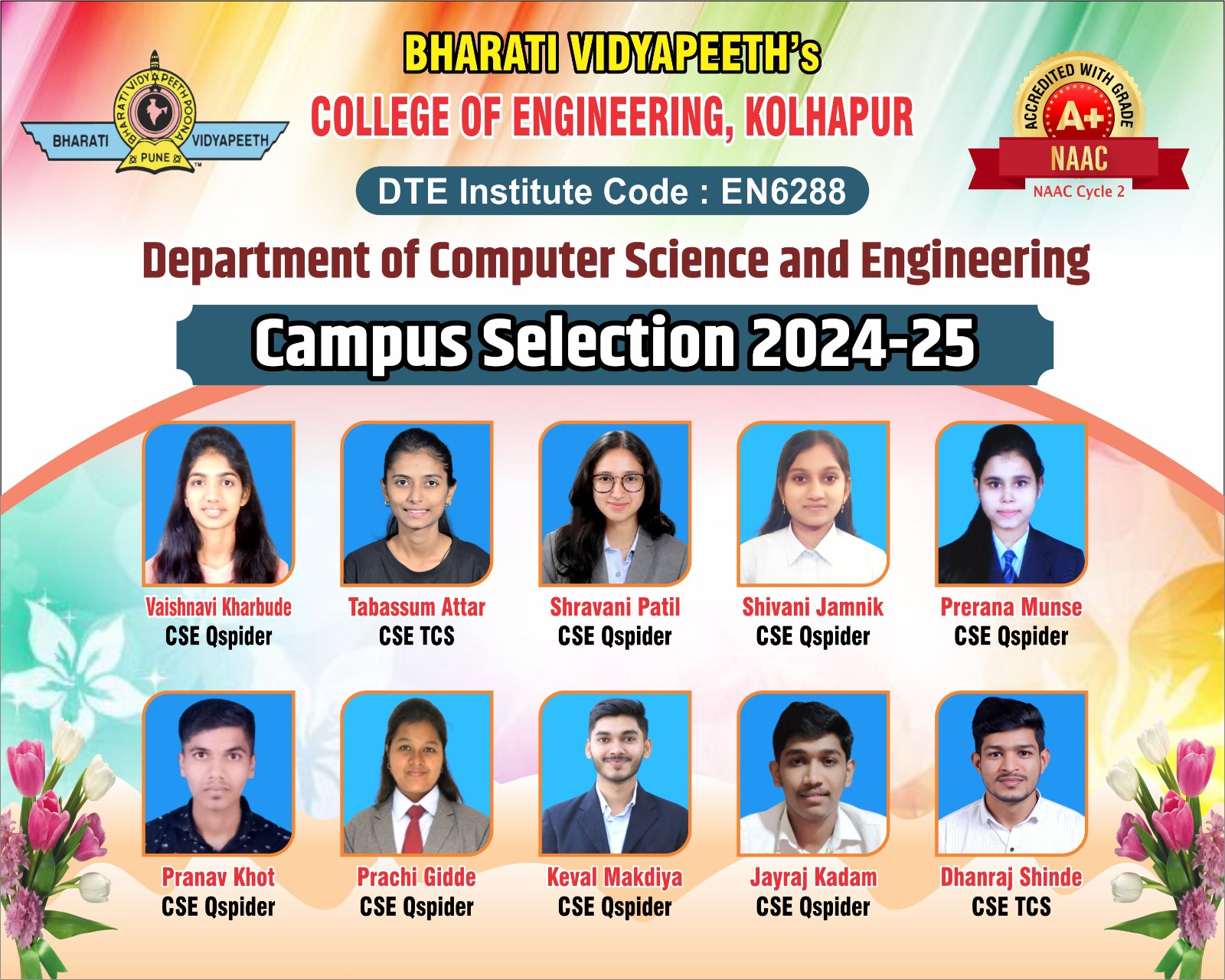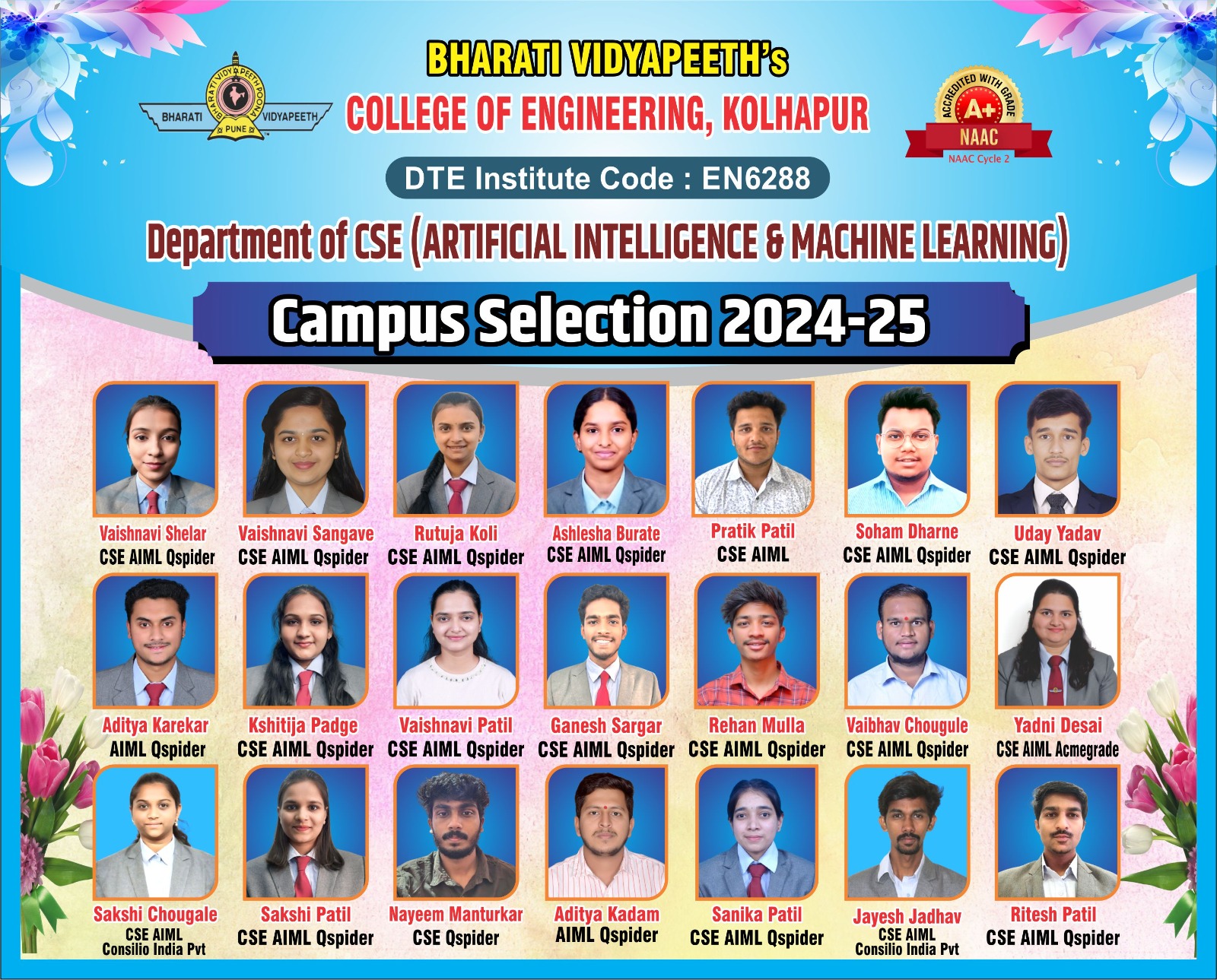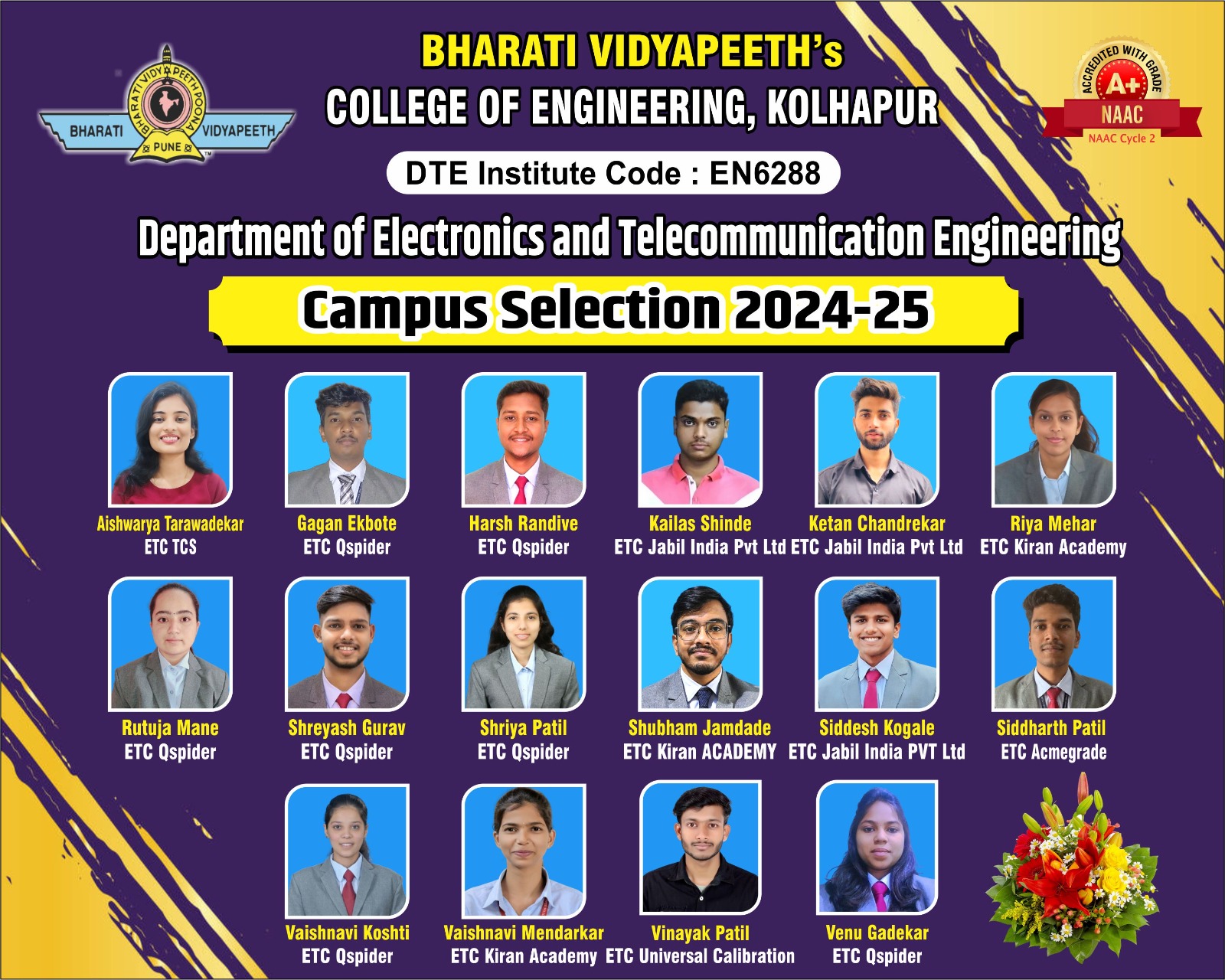Electronics And Telecommunication
Home
Salient Features of DepartmentA world is becoming a global village due to easy means of Electronics and communication. The field of Electronics and Telecommunication plays an important role in every day's life. Television, mobile, e-mail, microwave etc. are some examples. With the help of electronics it is possible to communicate from one point to multi point. Abundant opportunities are available to Electronics graduates in the expanding field of engineering & service industry as it the backbone of technology. Major Highlights of the department:1. Experienced and professionally qualified staff with innovative approach towards giving creative solutions to the students. 2. Continuous feedbacks, Guidance & Motivations from Principal, Management and Head of department. 3. Student centric approach. 4. Ergonomically oriented and established laboratories. 5. Institute -Industry interaction by arranging study tours, industrials visits and seminars of industry experts, on advanced aspects and opportunities. 6. Electronics and Telecommunication Students Association helps students for personality development and builds confidence in them. Vision:To nurture students on advance technologies in the field of Electronics and Telecommunication Engineering. Mission:
|
Program Educational Objectives (PEOs)
PEO
- PEO1: To train students to maintain, operate and design various electronics and communication circuits/products by using fundamental and advance knowledge in Electronics and Telecommunication Engineering.
- PEO2: To prepare and motivate students to invent new things in field of Research and Development and also to prepare students to excel in postgraduate programmes or to Succeed in industry/technical profession through global & rigorous education.
- PEO3: To prepare students to adapt to future changes in their discipline and also in multidisciplinary, as well as to have an in-depth understanding of a specialized area where they can better serve organization, industry and society.
- PEO4: To develop skills for clear communication and responsible teamwork, and to inculcate professional attitudes and ethics for student’s overall development
Program Outcomes
Program Outcomes (POs)
- Engineering Knowledge: Apply the knowledge of mathematics, science, engineering fundamentals, and an engineering specialization to the solution of complex engineering problems.
- Problem Analysis: Identify, formulate, research literature, and analyze complex engineering problems reaching substantiated conclusions using first principles of mathematics, natural sciences, and engineering sciences.
- Design/development of Solutions: Design solutions for complex engineering problems and design system components or processes that meet the specified needs with appropriate consideration for the public health and safety, and the cultural, societal, and environmental considerations.
- Conduct Investigations of Complex Problems: Use research-based knowledge and research methods including design of experiments, analysis and interpretation of data, and synthesis of the information to provide valid conclusions.
- Modern Tool usage: Create, select, and apply appropriate techniques, resources, and modern engineering and IT tools including prediction and modelling to complex engineering activities with an understanding of the limitations.
- The Engineer and Society: Apply reasoning informed by the contextual knowledge to assess societal, health, safety, legal and cultural issues and the consequent responsibilities relevant to the professional engineering practice.
- Environment and Sustainability: Understand the impact of the professional engineering solutions in societal and environmental contexts, and demonstrate the knowledge of, and need for sustainable development.
- Ethics: Apply ethical principles and commit to professional ethics and responsibilities and norms of the engineering practice.
- Individual and Team Work: Function effectively as an individual, and as a member or leader in diverse teams, and in multidisciplinary settings.
- Communication: Communicate effectively on complex engineering activities with the engineering community and with society at large, such as, being able to comprehend and write effective reports and design documentation, make effective presentations, and give and receive clear instructions.
- Project Management and Finance: Demonstrate knowledge and understanding of the engineering and management principles and apply these to one’s own work, as a member and leader in a team, to manage projects and in multidisciplinary environments.
- Life-long Learning: Recognize the need for, and have the preparation and ability to engage in independent and life-long learning in the broadest context of technological change.
Programme Specific Outcomes (PSOs)
At the end of successful completion of program, the students will be able to
- Apply fundamental knowledge of Electronics & Communication Engineering to real time problems in Industry & society
- To solve complex problems using latest electronics hardware & software tools to arrive cost effective and appropriate solutions
Infrastructure
Infrastructure
| Sr.No. | Name of classroom | Area in Sq.M. |
|
1 | Department Office |
20 |
|
2 | Meeting Room |
20 |
|
3 | Seminar Hall |
132 |
|
4 | Lecture Hall-01 |
87 |
|
5 | Lecture Hall-02 |
87 |
|
6 | Lecture Hall-03 |
87 |
|
7 | Tutorial Room -1 |
33 |
Laboratory
Laboratory
| UG-Laboratory | |||
| Sr. No. | Name of Laboratory | Area | Total Investment |
| 1 | Embedded System Lab | 67 Sq.m | Rs. 13,22,553/- |
| 2 | Robotics Lab | 65 Sq.m | Rs.11,82,977/- |
| 3 | Communication Engineering Lab | 69 Sq.m | Rs.18,97,352/- |
| 4 | Project Lab | 68 Sq.m | Rs.14,10,340/- |
| 5 | Advanced Programming Lab | 103 Sq.m | Rs.11,83,257/- |
| 6 | Analog Electronics Lab | 78 Sq.m | Rs.10,19,559/- |
| 7 | Advance Communication Lab | 85 Sq.m | Rs.18,35,981/- |
| 8 | Power and Video Engg. Lab | 67 Sq.m | Rs.8,84,086/- |
Total | Rs.78,11,495/- | ||
| PG-Laboratory | |||
| 1 | Research Lab | 77Sq.m | Rs.13,22,553/- |
Total | Rs. 13,22,553/- | ||
Quick Enquiry Form
Spot Round Admission DSY Notice 2025-26.
Merit List for Against CAP Vacancy DSY
Spot Round Admission Notice 2025-26
F.E. Merit List for Against CAP Vacancy 2025
F.E. Merit List for Institute Level Vacancy 2025
ACAP M.Tech Final Merit List
AGAINST CAP VACANT SEATS M TECH
Schedule of Activities for First Year Engineering Admission at Institute Level & Against CAP Level
Schedule of Activities for Direct Second Year Engineering Admission for Against CAP Level
Schedule of Activities for First Year Post Graduate Engineering (M.Tech) Admission for Against CAP Level



NCETET-2025



 Free
Free